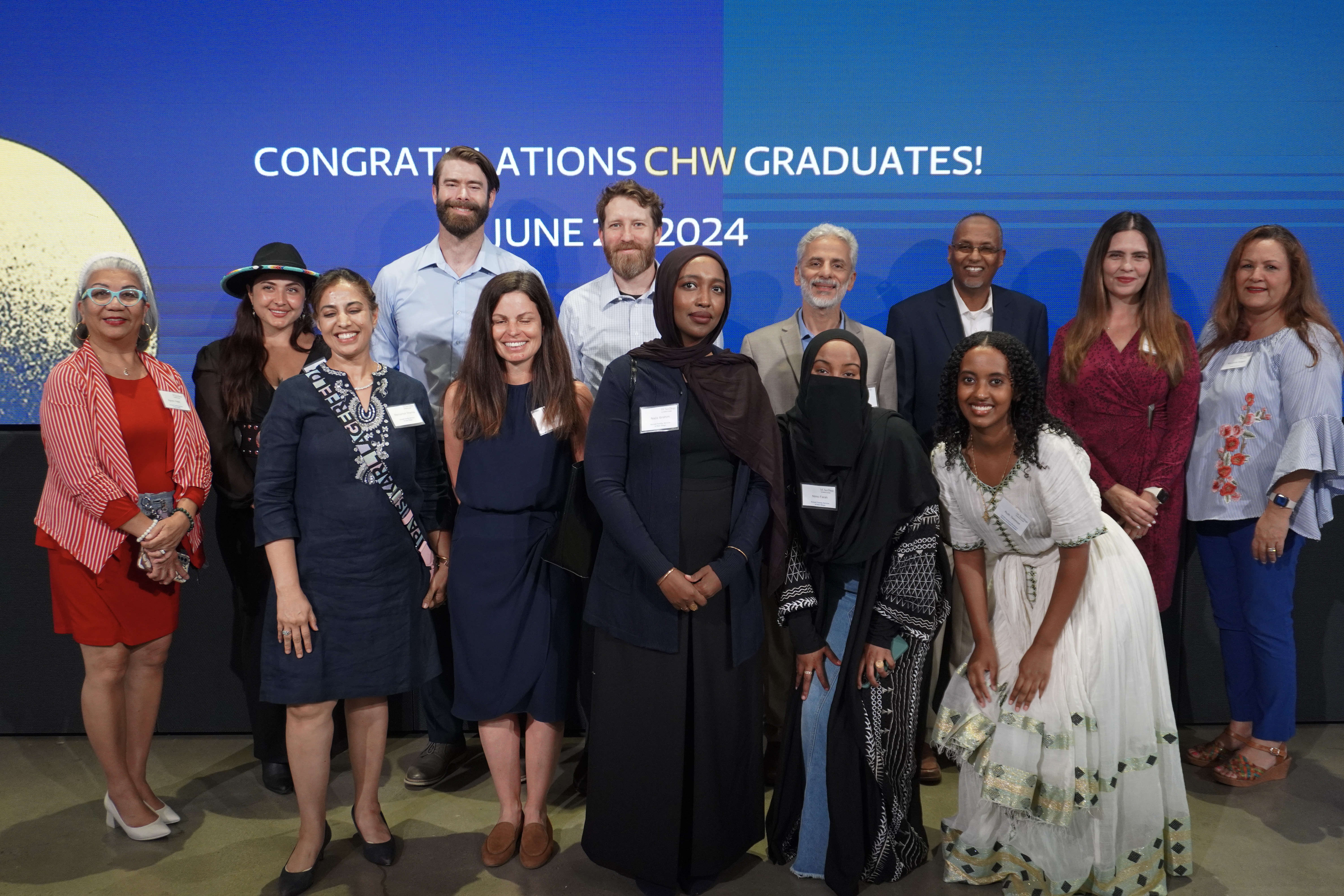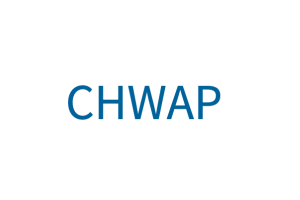 The Community Health Workers for Advancing Public Health within Immigrant/Refugee and Native American Communities Program
The Community Health Workers for Advancing Public Health within Immigrant/Refugee and Native American Communities Program
UNIVERSITY OF CALIFORNIA SAN DIEGO
Welcome to the Community Health Workers for Advancing Public Health within Immigrant/Refugee and Native American Communities Program (CHWAP), funded by the Health Resources and Services Administration.
This program is an academic-community collaborative led by The Herbert Wertheim School of Public Health and Human Longevity Science at UC San Diego and with involvement of the UC San Diego Extended Studies, UC San Diego Altman Clinical and Translational Research Institute (ACTRI) Center for Community Health, and Somail Family Service. Additionally, more than 14 community organization partners are also represented as part of our team, along with collaborations with the California Consortium for Urban Indian Health, the San Diego Workforce Partnership, the County of San Diego, Health Center Partners of Southern California, the Hospital Association of San Diego and Imperial Counties and Family Health Centers of San Diego.
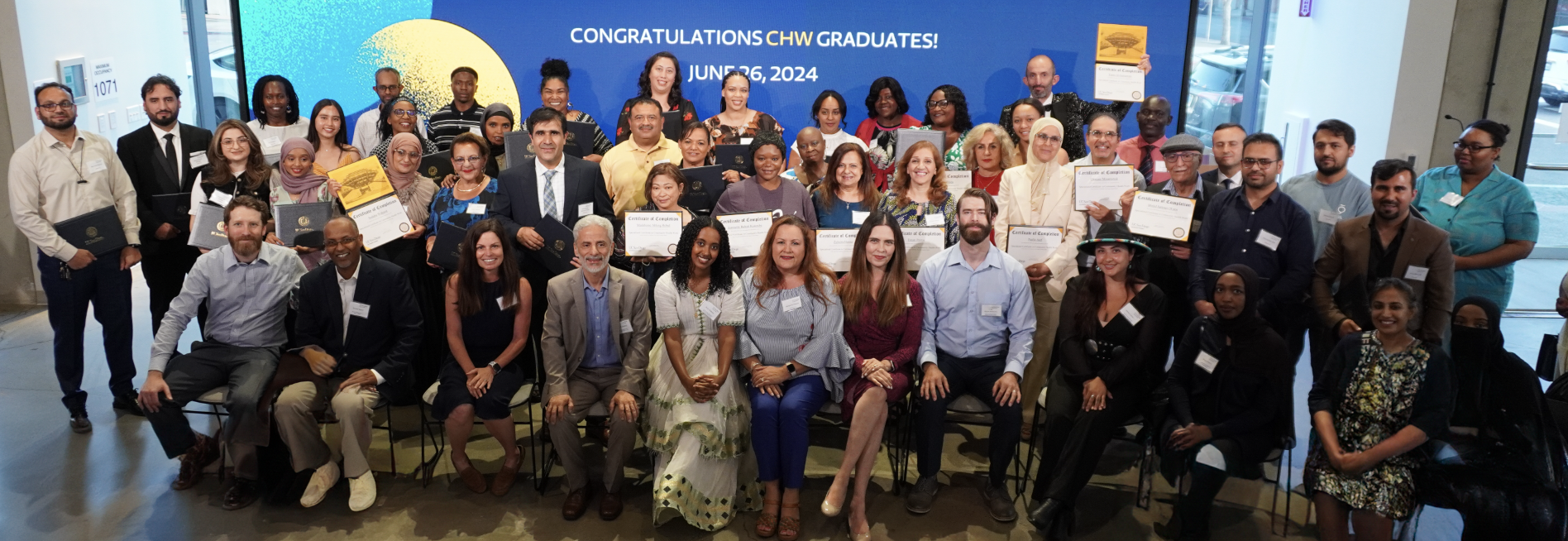
Purpose and Goals
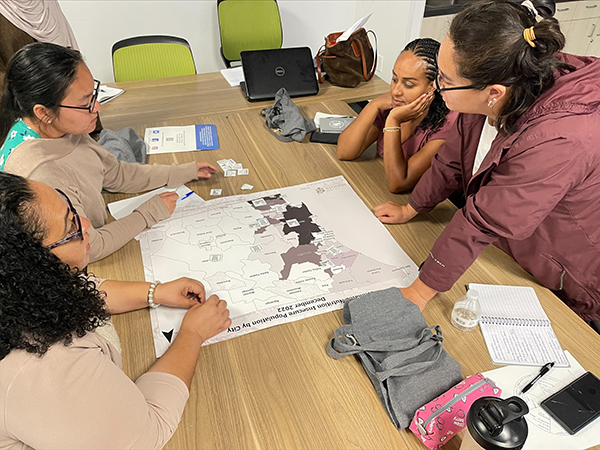
The purpose of the CHWAP program is to train community health workers and health support workers from underserved refugee and immigrant population of African, Afro-Caribbean, Asian and Middle Eastern backgrounds and American Indian communities through development and implementation of a streamlined recruitment, training and placement program grounded in academic-community partnership. Community health workers and health support workers trained through the program will then be a resource for their communities to address health care access and inequities through supporting linkages to care and public health education across key health topics related to COVID-19 and chronic conditions disproportionately impacting these communities.
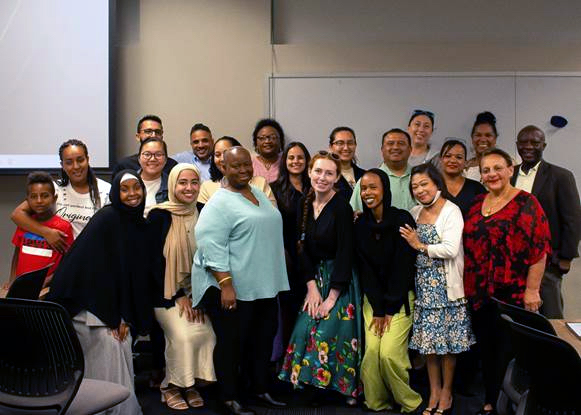
Key Goals:
Goal 1: Increase the Community Health Worker (CHW)/Health Support Worker (HSW) workforce among refugee and American Indian communities in San Diego and California, respectively.
Goal 2: Develop, refine, implement and expand curricular options for CHWs/HSWs specifically designed to meet the needs of target communities in public health education and services (e.g., support vaccination campaigns) including COVID-19.
Goal 3: Expand and improve the quality of the workforce of CHWs/HSWs providing healthcare support and public health services, with the aspiration to influence health inequities in our target communities.
Frequently Asked Questions
Program Eligibility
What are the requirements to be eligible for the Community Health Worker certificate program?
Applicants must meet the following requirements to participate:
- Be a San Diego or Imperial counties (California) resident and intend to seek employment in the region after completion of the certificate
- Identify as an immigrant, refugee or Indigenous/Native American
- Have a high school diploma or equivalent
- Be either a U.S. citizen or a U.S. permanent resident
- Have a history of community engagement
Certificate Overview
What type of certificate will I receive upon completion of the training program?
Students will receive a Specialized Certificate from UC San Diego Division of Extended Studies upon completion of the minimum course requirements. Completion of the certificate demonstrates evidence of specialized education, skills and competency within the field of community health work.
Will I be a certified Community Health Worker (CHW) in the state of California?
The Department of Health Care Services (DHCS) and the California Department of Health Care Access and Information (HCAI) have provided initial guidance regarding implementation of the state CHW/P/R certificate. Per the DHCS All Plan Letter of September 18, 2023, students will have met the minimum qualifications via a certificate of completion. As state policy changes are issued, Extended Studies will keep you informed as to what is required to maintain your eligibility to be reimbursed for the CHW services you perform with Medi-Cal members via the Medi-Cal CHW benefit.
Will my certification be recognized outside of the state of California?
Yes, UC San Diego is accredited by the Western Association of Schools and Colleges (WASC) and Extended Studies is accredited through the University. Please note every state has different policies and regulations for CHW certification/licensure. It is best to check with the Department of Health of the individual state in which you intend to provide care.
What are the requirements to complete the CHW certificate at Extended Studies?
Students must obtain a minimum of 9.5 quarter units within the Community Health Worker certificate program to complete the certificate. Students are required to take Essentials of Community Health work and two (2) additional elective courses of their choice. All courses must be completed with a passing grade (C- or higher).
Can I complete the entire certificate program remotely/virtually?
Yes, the certificate program can be completed remotely. We recommend access to a laptop and internet to successfully participate in courses. Please note, weekly attendance is required for all live online (Zoom) classes.
Can I enroll in more than one course per quarter?
In your first quarter, you can only enroll in Essentials of Community Health Work. Once you complete this course, you may take your final two (2) electives in the same quarter if you prefer. You can choose to take one course per quarter if you prefer or choose to not take any courses.
How long does the certificate take to complete?
Students will typically complete the certificate within two to three quarters. Students have up to one year to complete the certificate and should contact the program manager if they cannot complete the certificate within a year.
Can I enroll in more than three (3) courses?
Currently, you can only enroll in three (3) courses: Essentials of Community Health Work and two (2) electives of your choice. Additional Extended Studies courses may be taken, but the grant-funding will not cover the cost of any additional courses.
Course Overview
What course formats are offered?
Currently, the first course, Essentials of Community Health Work, is offered in two formats: in-person and live online (scheduled Zoom meetings). All electives except for Medical Terminology will be offered via a live online format. The Medical Terminology course is offered via an asynchronous online (independent online study) over a four-week period. Consideration for in-person formats will be on a case-by-case basis depending on instructor availability and student demand.
When are course sessions held?
Classes are held on a weekly basis and typically are offered either on weekday evenings or weekend mornings. Some courses may only have one section per quarter. We try our best to accommodate student scheduling demand.
How much time per week will I need to dedicate to a course?
Each course typically requires about three (3) to four (4) hours per week, which includes a minimum of two (2) hours of live classroom activity (either in-person or via Zoom). The exception to this is for the Advanced Skills in Community Health Work course, which is more rigorous and requires more time per week than the other courses. Each week may vary based on the course outline.
What types of activities will be required of students?
Each course may include lecture, discussion, group activities, projects, presentations, independent reading and/or field activity. All courses have an online component in which students will have access to our online learning management system, Canvas. Students will be expected to participate in Canvas discussion boards, independent learning activities and assessments throughout a course. Activities may vary depending on the course outline.
How do I enroll in courses?
A quarterly enrollment survey will be sent by the Extended Studies program manager via email. Individual academic counseling is available by request by emailing chwcertificate@ucsd.edu.
How do I drop a class if I am unable to continue?
Please send a drop request to chwcertificate@ucsd.edu. Courses must be dropped prior to the third class meeting.
Recruitment
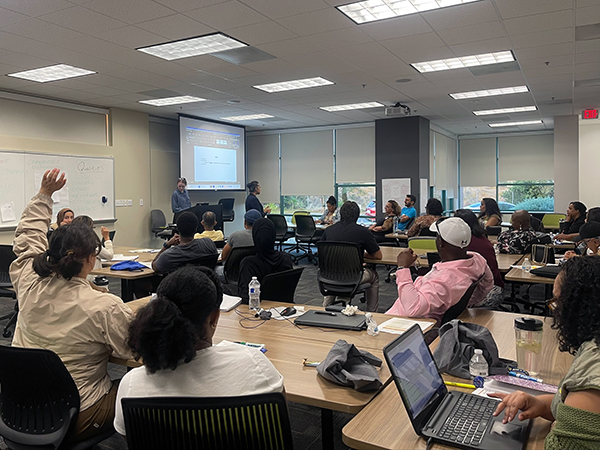
As part of CWHAP, we will recruit up to 200 community health workers and train them through certified training programs offered by UC San Diego to address gaps in health care access and health education in underserved local communities. Enrollment for the Summer 2024 cohort is now open and will run until June.
The aim is to address health inequity within local refugee, immigrant and American Indian communities. The community health workers and health support workers training will involve one basic module in community health training and three advanced modules in 1) health support, 2) soft skills development, and 3) leadership and self-care. Following training, the CWHAP program will support internship and apprenticeship placements to support job placement for those who are qualified. Select trainees will also receive higher level training to themselves become trainers of other CHWs in their respective communities.
All the expenses for this training will be covered by the program, including applicable tuition and other costs such as travel, child care, and other expenses incurred to attend training. For more details or if you are interested in participating, J.W. Wiebe-Anderson, program manager at jwiebeanderson@ucsd.edu, or fill out the online enrollment application.
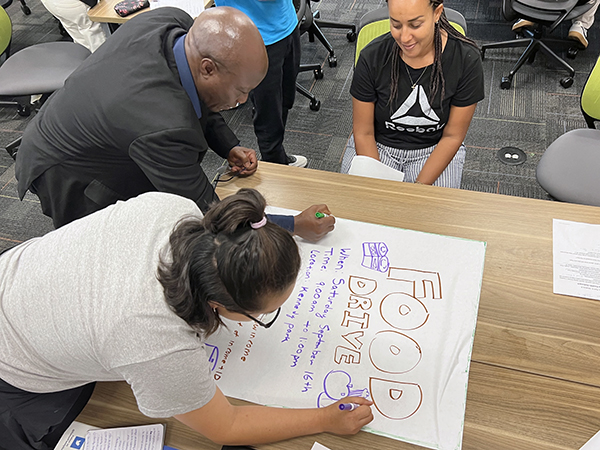
Testimonials
Hear directly from a few of the Community Health Works as they share reflections on their internship experiences with local employers.
“I am very grateful for my internship at Neighborhood Health Care Center. From the very first day, the team welcomed me with kindness and support. What stood out most to me was how patient and respectful they are with their clients, always taking the time to listen and meet their needs with compassion. This experience taught me the true value of patience, respect and dedication in healthcare. I also had the opportunity to build skills in communication, client support, and cultural sensitivity, which I know will guide me in my future work. I feel fortunate to have learned from such an inspiring team.” — Linda
“My internship at Mama’s Kitchen was such a meaningful experience. I got hands-on experience supporting clients through assessments, intake calls, and health plan enrollments, and I also had the chance to assist non-English-speaking clients. It really reinforced what I learned in the classroom, that Community Health Workers are the true backbone of the health care system, helping connect people to care and support those who need it most!”— Shannon
“I completed my internship with the Southern California Immigration Project, and it was an amazing and meaningful experience. I had the opportunity to connect with clients, learn about their needs, and help them find resources such as ESL classes, college programs and job opportunities. I also took part in outreach activities by creating awareness flyers and attending job fairs to gather information. This experience strengthened my confidence, communication skills and passion for helping others as a Community Health Worker.”— Asiya
“My internship with UC San Diego Health has been a truly extraordinary, exciting and extremely rewarding professional experience. It has been very inspiring and helped me see that I am definitely on the right professional and personal track.” — Graciela
“During my internship with Mama’s Kitchen, I had the opportunity to strengthen several key skills while supporting the client services and meal delivery programs. This experience helped me deepen my active listening skills and I learned the value of patience, empathy and genuine human connection in building trust and rapport. I also became comfortable using various client tracking and data management software, as well as spreadsheets to organize and analyze different data sets. I also participated in outreach calls, which strengthened my ability to promote programs in a personable and supportive way. Overall, the internship was an enriching experience that helped me refine both my technical and interpersonal skills while contributing to a meaningful cause.” — Urica
Meet the Team
Wael Al-Delaimy, MD, PhD, Director
Dr. Al-Delaimy is a professor of public health and global health at the Herbert Wertheim School of Public Health with experience working with diverse communities nationally and internationally. He has a medical degree from his native Iraq and is fluent in Arabic. Dr. Al-Delaimy also has a Doctor of Philosophy in Epidemiology from New Zealand where he worked with indigenous Maori populations and completed his post-doctoral training in nutritional epidemiology at the Harvard School of Public Health.
Eric Hekler, PhD, Co-Director
Dr. Hekler is director of the graduate specialization in design at the UC San Design lab and brings extensive expertise in managing educational programs. He is also associate dean of community partnerships and a professor of public health at the UC San Diego Herbert Wertheim School of Public Health, leading a team of faculty and staff to establish community partners locally and across the border in Mexico.
Blanca Melendrez, MA, Co-Director
Ms. Melendrez is executive director for the ACTRI Center for Community Health and co-chair of the Antiracism Health Disparities and Inequities Workstream at UC San Diego Health. She brings more than 20 years of experience in the non-profit and government sectors bringing together policy decision-makers, researchers and constituents to improve community health and reduce health disparities for low-income populations. Her work includes promoting healthy communities such as addressing institutional racism, racial health disparities, fighting for social justices in underserved communities, and building community collaborations and training resources.
Amina Sheik Mohamed, MPH, Community Recruitment and Education Lead
Ms. Sheik Mohamed is the Refugee Health Unit director within at the ACTRI Center for Community Health. Amina has gained recognition for her work with multicultural populations, particularly Arab, African, and African American women, youth and children in San Diego County and across California. She is founding director for the Refugee Health Unit and Youth Advisory Council.
Chag Lowery, MEd, Native American Community Outreach
Mr. Lowery is of Yurok, Maidu, and Achumawi native ancestry from California and is the current administrative director of the California American Indian Tobacco Initiative Evaluation program based at UC San Diego and involving 14 tribes in California. He is an active member of multiple Indigenous communities and Native American tribal governments throughout California, and has authored numerous publications on native history, culture, language and health.
Najla Ibrahim, MPH, Education and Community Recruitment Lead
Ms. Ibrahim is the Somali Family Services Health & Wellness program director and its principal investigator on this project. Herself a refugee from Somalia, Ms. Ibrahim has first-hand experience working with refugee communities in the San Diego region. She has a Master of Public Health and more than 10 years of experience in community public health initiatives.
Ruth Teseyem Tadesse, MPH, Community Recruitment & Education Staff
Ms. Tadesse serves as a community health project specialist within the Refugee Health Unit at the ACTRI Center for Community Health. She uses data to identify community needs prior to planning, implementing, monitoring and evaluating programs designed to encourage healthy lifestyles, policies and environments. Ms. Tadesse contributes to community based participatory research by working with various stakeholders, such as the San Diego Refugees Communities Coalition, to support community led data collection and data desegregation efforts to improve barriers to understanding refugees' behavioral health and health care needs.
HRSA Funding
This program is supported by the Health Resources and Services Administration (HRSA) of the U.S. Department of Health and Human Services (HHS) as part of an award totaling $3,000,000 with 0 percent financed with non-governmental sources. The contents are those of the author(s) and do not necessarily represent the official view of, nor an endorsement, by HRSA, HHS, or the U.S. Government. For more information, please visit HRS.gov.

